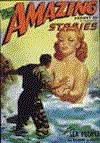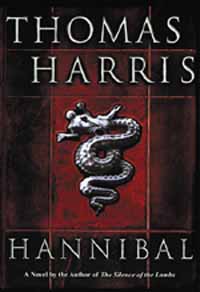|
|
|
'Hannibal the Cannibal' returns for another helping June 24, 1999 By Franklin Harris Thomas Harris -- no relation to the present author -- is a perfectionist. In a career that spans nearly 25 years, he has written only four novels. He took a decade to research and write his latest book, "Hannibal." So, the obvious question is, "Is 'Hannibal' worth the wait?" The answer is an enthusiastic and unqualified "yes."
"Hannibal" proves that genre fiction can also be great art. Simply put, it is a monumental book, at once grotesque and elegant. A lesser craftsman could never have pulled it off. The novel picks up seven years after where "The Silence of the Lambs" left off. Dr. Hannibal Lecter, known for mutilating, murdering and sometimes eating his psychiatric patients, is still at large following his bloody and spectacular escape in the previous novel. Meanwhile, Clarice Starling, the FBI trainee who allowed Lecter into her head in order to get the information she needed to stop a serial killer, is now a special agent. But her career has hit a dead end. She finds herself stymied by her own rebellious streak and her jealous superiors. Instead of tracking down serial killers for the FBI's Behavioral Science Department, Starling rides shotgun on routine drug raids. She is the babysitter of first resort when the FBI wants its share of another agency's bust. But when one such bust goes awry, the Justice Department decides to throw Starling to the media and the public as a scapegoat. Fresh meat. Into this equation steps Mason Verger, heir to a meat-packing fortune and grotesque survivor of Dr. Lecter's attentions, which left him noseless, lipless and eyelidless -- a crippled, bedridden, skeletal husk who wheezes in time with his respirator. Since Lecter's escape, Verger has devoted millions to capturing "Hannibal the Cannibal." Not that he has any intention of turning Lecter over to the authorities, of course. Verger has revenge on his mind. Using Starling, with whom Lecter is still obsessed, as bait, Verger sets in motion his plan to trap Lecter and subject him to a fitting punishment: being eaten alive by voracious wild pigs. To say anything further about the plot is to do a disservice. Harris' intricately woven narrative speaks for itself. "Hannibal" works, in large part, because Harris' writing is so effortless. He packs volumes of description into just a few lines, bringing his set pieces vividly to life. The act of consuming things -- both food and people, both figuratively and literally -- repeats itself throughout the novel, as do Harris' allusions to Dante and the Bible. Evil, the true star of the novel, can consume people in many ways. Several characters are convinced Lecter is the Devil himself. But Lecter's isn't the only evil Harris explores, even if it is the coldest, most elegant and most cerebral variation of the theme. Verger, for instance, is hardly a sympathetic victim. Rather, he is a former child molester reduced to tormenting small children from his sickbed. He got what he deserved when Lecter talked him into feeding his face to the dogs. While his victims are irredeemable, Lecter himself is seductive. There is a sense of justice even in his crimes. As one character notes, Lecter only eats the rude. When he goes after the likes of Mason Verger, Lecter becomes an Angel of Vengeance. He is doing the Lord's own work. Once Harris gives us some insights into Lecter's childhood -- into why Lecter is what he is -- Hannibal the Cannibal becomes almost sympathetic. Harris' greatest achievement with "Hannibal" is that, by the novel's end, Lecter has worked his way into the reader's mind just as he worked his way into Starling's in "The Silence of the Lambs." Gotcha! From the minor character he was when he first appeared in Harris' second novel, "Red Dragon," Hannibal Lecter has grown into a villain of legendary proportions. He is a Dracula for an age in which psychology has replaced superstition as the explanation of choice for why there is evil in the world. The novel's conclusion, in which the implications of Lecter's evil finally reveal themselves, is ultimately both the last thing one would expect and the only thing that would truly satisfy. It is a stroke of literary genius. Even if Harris never again returns to him, Hannibal Lecter will haunt the dark landscapes of our minds from now on. |

RECENT COLUMNS
Order a helping of Cartoon Network's 'Robot Chicken'
03/31/05
Campaign against video games is political grandstanding
03/24/05
Prize-winning author is 'Wrong About Japan'
03/17/05
Censored book not a good start
03/10/05
Some superhero comics are for 'fanboys' only
03/03/05
'Constantine' does well with its out-of-place hero
02/24/05
'80s publisher First Comics' legacy still felt
02/17/05
Director's cut gives new 'Daredevil' DVD an edge
02/10/05
Put the fun back into 'funnybooks'
02/04/05
Is 'Elektra' the end of the road for Marvel movies?
01/27/05
'House of Flying Daggers' combines martial arts and heart
01/20/05
Anniversary edition of 'Flying Guillotine' has the chops
01/13/05
Movie books still have role in the Internet era
01/06/05
Looking ahead to the good and the bad for 2005
12/30/04
The best and worst of 2004
12/23/04
'Has-been' Shatner is a 'transformed man'
12/16/04
© Copyright 2005 PULP CULTURE PRODUCTIONS
Web site designed by Franklin Harris.
Send feedback to franklin@pulpculture.net.
